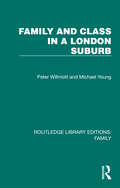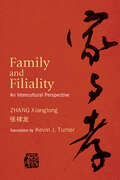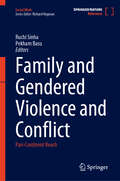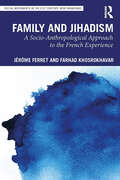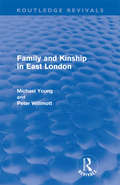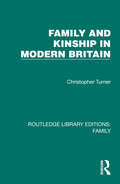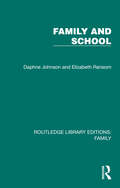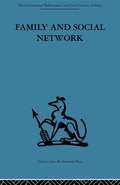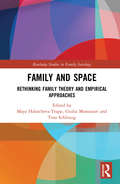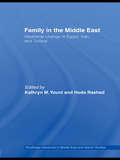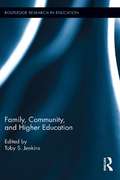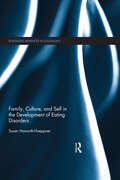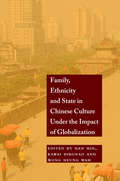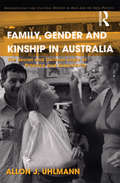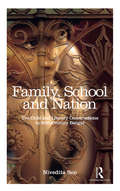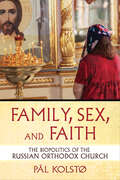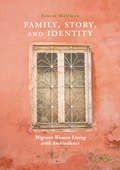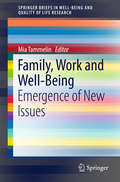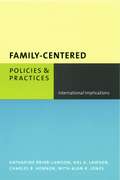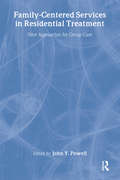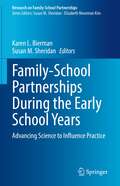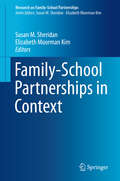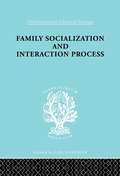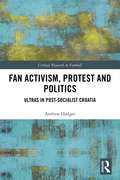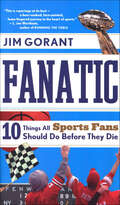- Table View
- List View
Family and Class in a London Suburb (Routledge Library Editions: Family)
by Michael Young Peter WillmottOriginally published in 1960, the authors of Family and Kinship in East London then made an intensive study of a middle-class dormitory suburb. Here families were more often on their own than in the East End, but, despite the differences between the districts, there were some similarities. The bond between mother and married daughter was almost as strong in the suburb as in the city. Most old people, too, were cared for in both places by their children and other relatives, though the authors show how serious were the special problems of the aged in this suburban setting. The enquiry examined the influence of social class upon community life. This is reviewed in relation to club and church membership and to friendship patterns, and the behaviour of middle and working-class people to each other is discussed. Class tensions, and their effect on the otherwise friendly and neighbourly atmosphere that the authors found in the suburb, provide the main theme of the final chapters.
Family and Filiality: An Intercultural Perspective (SUNY series, Translating China)
by Xianglong ZhangCompares Chinese and Western perspectives on the family.This book is a timely contribution to the growing field of the philosophy of the family. Drawing on a lifetime of research in Western and Chinese philosophy, Zhang Xianglong adopts a comparative perspective to navigate between Greek philosophy, phenomenology, and Confucianism to explore such topics as the nature of the family, filiality, human nature, temporality, memory, incest taboos, the future of Confucianism, and popular literature. He weaves his vast intercultural knowledge and understanding into penetrating philosophical, social, literary, and anthropological insights that reveal the strengths and weaknesses of Western and Chinese conceptions of the family. This book is a paradigm of comparative philosophy and demonstrates the value of the Chinese intellectual tradition for modern philosophy.
Family and Gendered Violence and Conflict: Pan-Continent Reach (Social Work)
by Ruchi Sinha Pekham BasuThis reference work collates academic discourses and practices around family, gender, and violence in social work. A huge body of discourse is available that categorizes and labels acts of violence, and correspondingly practices that pin blame/responsibility for the violence. These have led to evolution of intervention strategies to resolve or address the violence. Some explanations foreground systemic causes; others look at person-centric causes. The two views bring forth the fundamental ontological divide of structuralism and individualism. The question for social workers to debate is what to factor in while working with families experiencing violence and conflict. What amongst the person, the agency, or the structure needs to be addressed to understand the experience of families in conflict and violence? Are these positions supplementary, complementary, or to be understood reflexively? With the inclusion of new families, the parochial understanding of families has long been dislodged and given way to newer, radical, and contextual understanding of families. Similarly, different people, agencies, and states understand violence and conflict differently. Gender, too, has moved from the binaries of male and female to the gender-diverse LGBTQIA+ identities. The book positions the ontological premise on which the epistemological practise is located. Simply put, the person-centric ontology on families and violence epistemologically finds understanding in agency-based approaches in individual agency, whereas the structure-based approaches find the experience of families and violence in society, state, and the world order. The contributors locate their work around identification, definition, an intervention or empirical study, policy analysis, historical evolution of concepts, and ontological and paradigmatic debates to position their individual chapters. Family and Gendered Violence and Conflict: Pan-Continent Reach provides a paradigmatic prism for practice for social workers who are equipped to interpret context differently. The differing and competing paradigmatic lenses cannot be mediated, resolved, or addressed, but they definitely can be understood and debated to provide a 360-degree lens on the issues of families in violence in the gendered context. The reference work is a useful resource for social work practitioners, educators, academicians, researchers, and other development professionals.
Family and Jihadism: A Socio-Anthropological Approach to the French Experience (Social Movements in the 21st Century: New Paradigms)
by Jérôme FerretThis volume explores the paramount importance of family to jihadism in France, Spain and in Europe more generally. In France, special focus is given to the Mohammed Merah paradigmatic case study in the Toulouse region. In Spain, attention is given to the North and to Catalonia. With attention to both the concrete family - often in crisis - and the imaginary family invented by radicalized youth to substitute, this book shows the fundamental need among many jihadists to reconstitute the family, whether in the form of a clan or the imagined Caliphate (or neo-Ummah): a form of shared existence that offers escape from societies in which jihadists feel ill-at-ease. Demonstrating the failure of an emphasis on the individual actor to capture the meaning of jihadism, Family and Jihadism reveals the fundamental importance to our understanding of jihadist activity of the family (in an extended anthropological sense) - real or imagined - into which the individual is inserted. A study of the crisis of family and the re-creation of a new, enlarged family in the lives of young jihadists, this book will appeal to scholars of sociology, anthropology, politics and security studies with interests in radicalisation, political violence, social movements and religious violence.
Family and Kinship in East London (Routledge Revivals)
by Michael Young Peter WilmottFirst published in 1957 ,and reprinted with a new introduction in 1986, Michael Young and Peter Willmott’s book on family and kinship in Bethnal Green in the 1950s is a classic in urban studies. A standard text in planning, housing, family studies and sociology, it predicted the failure in social terms of the great rehousing campaign which was getting under way in the 1950s. The tall flats built to replace the old ‘slum’ houses were unpopular. Social networks were broken up. The book had an immediate impact when it appeared – extracts were published in the newspapers, the sales were a record for a report of a sociological study, Government ministers quoted it. But the approach it advocated was not accepted until the late 1960s, and by then it was too late. This Routledge Revivals reissue includes the authors' introduction from the 1986 reissue, reviewing the impact of the book and its ideas thirty years on. They argue that if the lessons implicit in the book had been learned in the 1950s, London and other British cities might not have suffered the 'anomie' and violence manifested in the urban riots of the 1980s.
Family and Kinship in Modern Britain (Routledge Library Editions: Family)
by Christopher TurnerIn the 1960s the family had been described as ‘by far the most important primary group in society’. The primary concern of the sociologist was to understand the functioning of family life in any given society and to set his observations in the wider framework of the relation of kinship systems to social structures. In this study, originally published in 1969, Dr Turner’s aim was to present a conceptual scheme for the analysis of family and kinship in modern Britain at the time. However, in doing so, he was able to use the particular example to illustrate general principles of the analysis of kinship. But the family is not a static entity and the author’s approach to his subject is processual. He views the family both as an entity passing through a cycle of development and decline and also as an element in an ever-changing social structure. This study is necessarily inexorably linked with other aspects of sociology: with class, education, socialization, occupation and many other topics.
Family and School (Routledge Library Editions: Family)
by Elizabeth Ransom Daphne JohnsonOriginally published in 1983, this book offers a perspective on the secondary school years from the standpoint at home. In the early 1980s as now, there was no shortage of advice to parents on how they should bring up their children, and what their relationship should be with the schools their children attended. More rarely heard was the parent’s voice of experience on the stages of family life and how the children’s school life is seen from the family point of view. The purpose of this book was to urge reconsideration of taken-for-granted assumptions about the appropriate relationship between home and secondary school. It can be read today in its historical context.
Family and Social Network: Roles, Norms and External Relationships in Ordinary Urban Families (Reprint Series In Social Sciences)
by Elizabeth BottTavistock Press was established as a co-operative venture between the Tavistock Institute and Routledge & Kegan Paul (RKP) in the 1950s to produce a series of major contributions across the social sciences. This volume is part of a 2001 reissue of a selection of those important works which have since gone out of print, or are difficult to locate. Published by Routledge, 112 volumes in total are being brought together under the name The International Behavioural and Social Sciences Library: Classics from the Tavistock Press. Reproduced here in facsimile, this volume was originally published in 1957 and is available individually. The collection is also available in a number of themed mini-sets of between 5 and 13 volumes, or as a complete collection.
Family and Space: Rethinking Family Theory and Empirical Approaches (Routledge Studies in Family Sociology)
by Maya Halatcheva-Trapp Giulia Montanari Tino SchlinzigWhile the ‘spatial turn’ within the social sciences has already nurtured a broad discussion of the relation between society and space, little attention has so far been paid to the question of what we can learn about families when exploring space in its different facets. This book brings together international authors from the fields of sociology, human geography, and anthropology to support the development of space-sensitive and de-territorialised perspectives on the family that reach beyond classical concepts such as the ‘household’ or the ‘nuclear family’. With close attention to the implications of differing relations to space for the social fabric of families, it presents studies of theoretical, methodological, and empirical aspects of late-modern family life. Examining the meaning of absence and presence for parenting, the aesthetic, and sensual dimensions of everyday family life, and its digital and media-related features aspects, Family and Space considers the value of a range of approaches to researching the spatial elements of family life, including ethnographic accounts, interviews, group discussions, mobile methods, and network analyses.
Family in the Middle East: Ideational change in Egypt, Iran and Tunisia (Routledge Advances in Middle East and Islamic Studies #15)
by Kathryn M. Yount Hoda RashadThis book examines, in comparative perspective, the different ideals about family and society and how they have impacted on real family life across a number of countries in the Middle East.
Family, Community, and Higher Education (Routledge Research in Education #89)
by Toby S. JenkinsThis book explores social topics and experiences that illustrate the various ways in which the family unit influences and impacts college students. In the text, the authors not only explore family memories, but also challenge the traditional lack of inclusion and appreciation for “family” as knowledge producers and educational allies. This book spotlights the family unit as a critical factor within the educational experience—one that prepares, supports, and sustains educational achievement through both everyday simple lessons and critical and difficult family challenges. Through these experiences, families teach the lessons of survival that often help students to persist in college.
Family, Culture, and Self in the Development of Eating Disorders (Routledge Advances in Sociology)
by Susan Haworth-HoeppnerThis book takes a unique approach to the examination of the eating disorder, anorexia nervosa (and bulimia). White, middle-class, heterosexual women share their insights into the emergence of their illnesses through detailed interviews that consider perceptions of the role of family, the influence of cultural messages regarding thinness and beauty, the agency these women exert in the use of weight control to cope with life’s stressors, the meaning they attach to their eating disorders and how these issues together perpetuate their disease. The book uses a Symbolic Interactionist framework and a grounded theory approach to examine the narratives which emerge from these women’s stories. Themes of family, culture, and self arise in their narratives; these form the theoretical underpinnings for this book, and combine to shape the comprehensive model of eating disorders that emerges from this study. Haworth-Hoeppner’s book will appeal to researchers and advanced students of sociology, women’s studies, family studies, social psychology, and gender studies.
Family, Ethnicity and State in Chinese Culture Under the Impact of Globalization (Bridge21 Publications)
by Han Min Kawai HironaoThis collection of papers from a project of the National Museum of Ethnology in Japan, unites anthropologists in an international collaborative effort to reexamine the dynamics of family, ethnicity, and the nation-state in China and in overseas Chinese society. Using ethnographic fieldwork, this book sheds light on the interactions between state, society, and identity through a variety of channels, such as family, lineage, kinship or quasi-kinship network, national frameworks such as religion association, Minority Autonomous Regions, and ethnic dress. This research demonstrates that even for the same cultural phenomenon, the discourses at the common, the elite, and the institutional levels will be adjusted based on the needs of the social context, market economy, and global networks.
Family, Gender and Kinship in Australia: The Social and Cultural Logic of Practice and Subjectivity (Anthropology and Cultural History in Asia and the Indo-Pacific)
by Allon J. UhlmannThis ethnographically-based exploration draws on sociological, historical and demographic data to provide a comprehensive analysis of family, gender and kinship in Australia, which informs modern kinship and gender at large. Allon Uhlmann charts the cultural basis that underlies kinship practices and argues that the Australian family is characterized by deep cultural and social continuities rather than the common view that the family is undergoing substantial change. He further shows how the modern family both shapes, and is shaped by, broad social and economic processes. This analysis provides greater insight into this critical field of practice as well as showcasing a novel analytical approach to practice that is rooted in the sociology of practice and in the anthropology of cognition. The book also suggests changes to the way in which social scientists currently treat family and kinship.
Family, School and Nation: The Child and Literary Constructions in 20th-Century Bengal
by Nivedita SenThis seminal work examines the concurrence of childhood rebellion and conformity in Bengali literary texts (including adult texts), a pertinent yet unexplored area, making it a first of its kind. It is a study of the voice of child protagonists across children’s and adult literature in Bengali vis-à-vis the institutions of family, the education system, and the nationalist movement in the ninenteenth and twentieth centuries.
Family, Sex, and Faith: The Biopolitics of the Russian Orthodox Church (NIU Series in Slavic, East European, and Eurasian Studies)
by Pål KolstøFamily, Sex, and Faith is the first systematic examination of what the Russian Orthodox Church (ROC) teaches and how believers respond to its messages regarding issues such as marriage, divorce, contraception, abortion, husband-wife relations, and LGBTQIA+ rights. According to Pål Kolstø, for the ROC, the ethics of private life involve what Michel Foucault called "biopolitics": the state regulates the sex lives of its citizens to control the development of the population.Family, Sex, and Faith offers a systematic analysis of aspects of the moral theology of the ROC, discussing the means and strategies it employs to achieve its goals, to counter resistance, and to emerge victorious from the battles in which it is embroiled. Although the constitution defines Russia as a secular state, the ROC has achieved a privileged position in society, functioning as a major provider of ideology and legitimacy for the Putin regime.
Family, Story, and Identity: Migrant Women Living with Ambivalence
by Senem MallmanHow do second-generation migrant women connect with their cultural heritage when ethnic ties have been weak or absent for most of their lives? Family, Story and Identity presents the life stories of twenty women of various ethnicities, analysis of published autobiographies, as well as autoethnographic accounts of the author’s experiences, to show how stories connect adult children of immigrants with their cultural heritage. The collecting of stories comes in various forms and can include brief visits to ancestral homelands, documenting family histories and genealogies, and gathering stories, folktales, and recipes. Senem Mallman found that, as adults, many children of immigrants actively seek out family histories and stories in order to connect with their cultural heritage and with their parents, and to pass this knowledge on to their own children. She argues that seeking out stories enables the second-generation to find a place within their family narrative. This pursuit of stories leads them toward developing new perspectives about their culture, family and life in Australia, and new ways of living with their cultural ambivalence.
Family, Work and Well-Being: Emergence Of New Issues (SpringerBriefs in Well-Being and Quality of Life Research)
by Mia TammelinThis book analyses the current state-of-the-art research on families, working hours and well-being in Europe, addressing both paid and non-paid work from a family perspective, and introducing emerging issues related to working hours and family life. Further, it discusses the implications of these issues for the well-being of individuals and families. Examining topics such as the division of paid and non-paid work within families, flexibility patterns, the 24/7 society, intensification of work, and the implication of mobile technology for work–family relations, it illustrates how the experiences of working families differ depending on their socio-economic status
Family-Centered Policies and Practices: International Implications
by Katharine Briar-Lawson Hal Lawson Charles HennonAnalyzing the critical juncture of family-centered policy and practice, this book places the universal institution of the family in a global context. By including a conceptual framework as well as practice components, the authors offer an original multimodal approach toward understanding family-centered policy practice from an international perspective. It provides grassroots strategies for activists and practical guides for both students and practitioners and includes cutting-edge interpretations of the impact of globalization on families, social workers, and other helping professionals and advocates.
Family-Centered Services in Residential Treatment: New Approaches for Group Care
by John Y PowellAdopt a more effective approach to temporary and long-term residential care! Presenting the voices of staff, parents, and residents, Family-Centered Services in Residential Treatment: New Approaches for Group Care examines the changes and challenges of residential care from the old-fashioned orphanage to the modern group-care home. These thoughtful essays offer suggestions and methods to provide more effective services in temporary and long-term settings. Containing case studies, personal experiences, and professional insights about the potentials and limitations of residential care, this reliable resource will help you develop improved services for youths and their families. Family-Centered Services in Residential Treatment presents fresh evaluations of new and old techniques as well as ideas for meeting individual needs. By building connections among parents, youths, and staff, you can develop more successful treatment programs and encourage stronger family ties even when children are best served by long-term residential care.Family-Centered Services in Residential Treatment addresses the crucial questions of residential care, including:how can staff ease children's transitions into and out of residential care? what do parents of emotionally disturbed youth need from the staff and professionals in a residential care setting? what was right--and wrong--about the old-fashioned orphanage? Could such an institution work today? how does the transition to the teamwork approach affect staff members? when is residential care most beneficial to children? what kind of care is appropriate for AIDS orphans?Family-Centered Services in Residential Treatment will help psychologists, therapists, and social workers unite theory and practice to create a family-oriented environment for troubled clients.
Family-School Partnerships During the Early School Years: Advancing Science to Influence Practice (Research on Family-School Partnerships)
by Susan M. Sheridan Karen L. BiermanThis book presents research-based family-school intervention programs that target the specific developmental period of preschool through the early elementary years, focusing on promoting positive child transitions into school. It explores critical intervention issues, including the need to understand mechanisms of efficacy, issues with real-world implementation, and methods for scaling family-school interventions. The volume references developmental research to highlight the importance of family-school partnerships at this critical transition period. Several chapters briefly describe research on proven intervention models that are effective in promoting family-school partnerships as children enter kindergarten and foster positive school outcomes. Each chapter concludes with a review of the most critical next steps in family-school intervention research within the context of the early school years. At the end of the book, several commentary chapters address overall implications for future research and methods for advancing the field, including perspectives on research-informed family-school practices and policies. Not only does the volume highlight interventions that work effectively to engage families with schools, it focuses on identifying critical components and processes that may underlie effective intervention outcomes and offers agendas for future research and intervention diffusion efforts. Key topics of coverage include: Presenting the logic model of the intervention program.Exploring questions concerning critical elements of family-school partnerships that may account for children’s positive outcomes.Discussing the challenges and strategies for scalability and broad diffusion. Family-School Partnerships During the Early School Years is a valuable resource for researchers, professionals and graduate students in child and school psychology, educational policy and politics, family studies, developmental psychology, sociology of education, sociology, and anthropology.
Family-School Partnerships in Context
by Susan M. Sheridan Elizabeth Moorman KimThis volume focuses on context considerations in family-school partnership research. The book examines how cultural diversity, including differences in parenting (e. g. , race, education, family history) and diverse school variables (e. g. , location, population, organization,) can affect family-school partnerships. Its bio ecological perspective pinpoints critical areas that studies need to address for real-world utility, such as parental commitment and developmental considerations. Although the book's focus is research, chapters present program designs and evaluations along with ideas for community involvement and policy. The authors also explore the changing landscape for home-school partnerships resulting from the impact of technology, which is rapidly becoming a central player in organizing research and bringing interventions to life. Topics covered include: Complexities in field-based partnership research. Family-centered, school-based interventions. A district leadership approach to school, family and community partnerships. Research issues to forward a policy agenda supporting family-school partnerships. Testing statistical moderation in research on home-school partnerships. Integrating current and evolving knowledge toward future directions for research. Contexts of Family-School Partnerships is a valuable resource for researchers, professionals and graduate students in child and school psychology, educational policy and politics, family studies, developmental psychology, sociology of education, sociology and anthropology.
Family: Socialization And Interaction Process (International Library of Sociology #Vol. 7)
by Talcot Parsons Robert F. BalesThis is Volume VII of fifteen in a series on the Sociology of Gender and the Family. Originally published in 1956, this collection of papers demonstrates the authors’ interest is in the functioning of the modern American family and its place in the structure of our society and that perhaps the most important function of the family lies in its contribution to the socialization of children. In view of this fact an analysis of the family with special reference to its functions as a socializing agency should contribute importantly to our understanding, both of the family itself and of its relations to the rest of the social structure in which it exists.
Fan Activism, Protest and Politics: Ultras in Post-Socialist Croatia (Critical Research in Football)
by Andrew HodgesIn what sense can organized football fans be understood as political actors or participants in social movements? How do fan struggles link to wider social and political transformations? And what methodological dilemmas arise when researching fan activism? Fan Activism, Protest and Politics seeks ethnographic answers to these questions in a context – Zagreb, Croatia – shaped by the recent Yugoslav wars, nation-state building, post-socialist ‘transition’ and EU accession. Through in-depth ethnography following the everyday subcultural practices of a left-wing fan group, NK Zagreb's White Angels, alongside terrace observations and interviews conducted with members of GNK Dinamo's Bad Blue Boys, this book details fans' interactions with the police, club management, state authorities and other fan groups. Themes ranging from politics, socialization, masculinity, sexuality and violence to fan authenticity are examined. In moving between two groups, the book explores methodological issues of wider relevance to researchers using ethnographic methods. This is important reading for students and researchers alike in the fields of football studies, regional studies of the former Yugoslavia and post-socialism, political sociology and social movements, and studies of masculinity, gender and sexuality. A useful resource for scholars writing about social movements and protest, or post-socialist subcultural scenes in south-east Europe, the book is also a fascinating read for policymakers interested in better understanding the contemporary (geo)political situation in the region.
Fanatic: 10 Things All Sports Fans Should Do Before They Die
by Jim GorantThe sport lover's ultimate road tripWhen Jim Gorant, a Sports Illustrated staffer and lifelong sports fan, discovered that he had never attended a single one of sports' most iconic events, he wondered, What kind of sports fan am I, anyway? And if he had to pick the top ten, what would those events be? The result was a growing obsession, first with determining the events that should make the list and then with actually attending all of them. A personal challenge quickly evolved into a yearlong journey into the heart of sports.From the Kentucky Derby to the Super Bowl, from a day game at Wrigley Field to a fortnight at Wimbledon, from the NCAA Final Four to the frozen tundra of Lambeau Field, Gorant takes us along for the ride, evoking the best (and sometimes the worst) sports has to offer. He enters the inner sanctum of NASCAR, watching the decidedly American pomp and circumstance perched atop an RV. He encounters a fire-eating Patriots fan at the Super Bowl. He sees Jack Nicklaus tee off at the azalea-lined Masters for the last time. He walks a fine line between the football rivals Ohio State and Michigan. And in the process he reveals why sports can so affect our lives.Part adventure, part pilgrimage, Fanatic captures these ten unforgettable sports events in all their color and commotion. The perfect gift for sports enthusiasts, Fanatic is the next best thing to front row seats, and every bit as fun.
